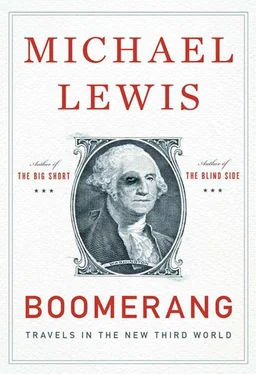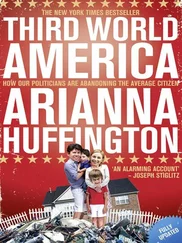“Are you sure the French belong?”
“We discussed this,” he says seriously. They decided that for social reasons you couldn’t really exclude the French. It was just too awkward.
As he presided over the Maastricht treaty, which created the euro, the French prime minister François Mitterrand is rumored to have said privately that yoking Germany to the rest of Europe in this way was sure to lead to imbalances, and the imbalances were certain to lead to some crisis, but by the time the crisis struck he’d be dead and gone—and others would sort it out. Even if Mitterrand didn’t say exactly that, it’s the sort of thing he should have said, as he surely thought it. At the time it was obvious to a lot of people, and not only Bundesbank governors, that these countries did not belong together.
But then how did people who seem as intelligent and successful and honest and well organized as the Germans allow themselves to be drawn into such a mess? In their financial affairs they’d ticked all the little boxes to ensure that the contents of the bigger box were not rotten, and yet ignored the overpowering stench wafting from the big box. Nölling felt the problem had its roots in German national character. “We entered Maastricht because they had these rules ,” he says, as we move off to his kitchen and plates heaped with the white asparagus Germans take such pride in growing. “We were talked into this under false pretenses. Germans are, by and large, gullible people. They trust and believe. They like to trust. They like to believe.”
If the deputy finance minister has a sign on his wall reminding him to see the point of view of others, here is perhaps why. Others do not behave as Germans do: others lie. In this financial world of deceit Germans are natives on a protected island who have not been inoculated against the virus carried by visitors. The same instincts that allowed them to trust Wall Street bond salesmen also allowed them to trust the French, when they promised there would be no bailouts, and the Greeks, when they swore that their budget was balanced. That is one theory. Another is that they trusted so easily because they didn’t care enough about the cost of being wrong, as it came with certain benefits. For the Germans the euro isn’t just a currency. It’s a device for flushing away the past. It’s another Holocaust Memorial. The Greeks may have German public opinion polls running against them, but deeper forces run in their favor.
In any case, if you are obsessed with cleanliness and order yet harbor a secret fascination with filth and chaos, you are bound to get into some kind of trouble. There is no such thing as clean without dirt. There is no such thing as purity without impurity. The interest in one implies an interest in the other. The young German woman who had driven me back and forth across Germany exhibits interest in neither, and it’s hard to say whether she is an exception or a new rule. Still, she marches dutifully into the world’s largest red-light district, seeking out a lot of seedy-looking German men to ask them where she might find a female mud wrestling show. Even now she continues to find new and surprising ways in which Germans find meaning in filth. “ Scheisse glänzt nicht, wenn man sie poliert : Shit won’t shine, even if you polish it,” she says, as we pass the Funky Pussy Club. “ Scheissegal : it just means ‘I don’t give a shit.’” She laughs. “That’s an oxymoron in Germany, right?”
The night is young and the Reeperbahn is hopping: it’s the closest thing I’ve seen in Germany to a mob scene. Hawkers lean against sex clubs and sift likely customers from the passing crowds. Women who are almost pretty beckon men who are clearly tempted. We pass several times the same corporate logo, of a pair of stick figures engaged in anal sex. Charlotte spots it and remembers that a German band, Rammstein, was arrested in the United States for simulating anal sex on stage while performing a song called “Bück Dich” (Bend Over). But on she charges, asking old German men where to find the dirt. At length she finds a definitive answer, from a German who has worked here for decades. “The last one shut down years ago,” he says. “It was too expensive.”
V

TOO FAT TO FLY
On August 5, 2011, moments after the U.S. government watched a rating agency lower its credit rating for the first time in American history, the market for U.S. Treasury bonds soared. Four days later, the interest rates paid by the U.S. government on its new ten-year bonds had fallen to the lowest level on record, 2.04 percent. The price of gold rose right alongside the price of U.S. Treasury bonds, but the prices of virtually all other stocks and bonds in rich Western countries went into a free fall. The net effect of a major U.S. rating agency’s saying that the U.S. government was less likely than before to repay its debts was to lower the cost of borrowing for the U.S. government and to raise it for everyone else. This told you a lot of what you needed to know about the ability of the U.S. government to live beyond its means: it had, for the moment, a blank check. The shakier the United States government appeared, up to some faraway point, the more cheaply it would be able to borrow. It wasn’t exposed yet to the same vicious cycle that threatened the financial life of European countries: a moment of doubt leads to higher borrowing costs, which leads to greater doubt, and even higher borrowing costs, and so on until you become Greece. The fear that the United States might actually not pay back the money it had borrowed was still unreal.
On December 19, 2010, the television news program 60 Minutes aired a thirteen-minute piece about U.S. state and local finances. The correspondent Steve Kroft interviewed a private Wall Street analyst named Meredith Whitney, who, back in 2007, had gone from being obscure to famous when she correctly suggested that Citigroup’s losses in U.S. subprime bonds were far bigger than anyone imagined, and predicted the bank would be forced to cut its dividend. The 60 Minutes segment noted that U.S. state and local governments faced a collective annual deficit of roughly half a trillion dollars, and noted another trillion-and-a-half-dollar gap between what the governments owed retired workers and the money they had on hand to pay them. Whitney pointed out that even these numbers were unreliable, and probably optimistic, as the states did a poor job of providing information about their finances to the public. New Jersey governor Chris Christie concurred with her and added, “At this point, if it’s worse, what’s the difference?” The bill owed by American states to retired American workers was so large that it couldn’t be paid, whatever the amount. At the end of the piece Kroft asked Whitney what she thought about the ability and willingness of the American states to repay their debts. She didn’t see a real risk that the states would default, because the states had the ability to push their problems down to counties and cities. But at these lower levels of government, where American life was lived, she thought there would be serious problems. “You could see fifty to a hundred sizable defaults, maybe more,” she said. A minute later Kroft returned to her to ask her when people should start worrying about a crisis in local finances. “It’ll be something to worry about within the next twelve months,” she said.
That prophecy turned out to be self-fulfilling: people started worrying about U.S. municipal finance the minute the words were out of her mouth. The next day the municipal bond market tanked. It kept falling right through the next month. It fell so far, and her prediction received so much attention, that money managers who had put clients into municipal bonds felt compelled to hire more people to analyze states and cities, to prove her wrong. (One of them called it “The Meredith Whitney Municipal Bond Analyst Full Employment Act.”) Inside the financial world a new literature was born, devoted to persuading readers that Meredith Whitney didn’t know what she was talking about. She was vulnerable to the charge: up until the moment she appeared on 60 Minutes she had, so far as anyone knew, no experience at all of U.S. municipal finance. Many of the articles attacking her accused her of making a very specific forecast—as many as a hundred defaults within a year!—that had failed to materialize. (Sample Bloomberg News headline: MEREDITH WHITNEY LOSES CREDIBILITY AS MUNI DEFAULTS FALL 60%.) The whirlwind thrown up by the brief market panic sucked in everyone who was anywhere near municipal finance. The nonpartisan, dispassionate, sober-minded Center on Budget and Policy Priorities, in Washington, D.C., even released a statement saying that there was a “mistaken impression that drastic and immediate measures are needed to avoid an imminent fiscal meltdown.” This was treated in news accounts as a response to Meredith Whitney, as she was the only one in sight who could be accused of having made such a prediction.
Читать дальше













